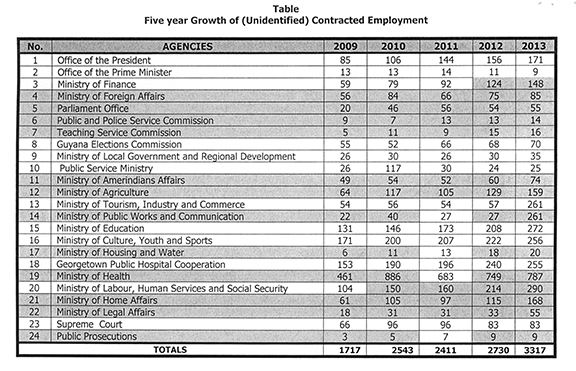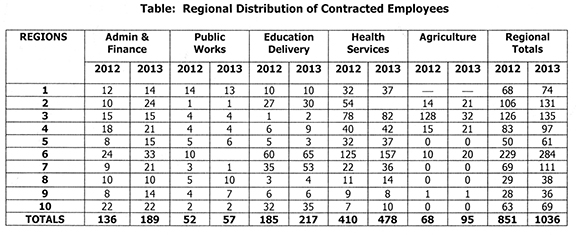Dear Editor,
The issue is sufficiently important to warrant more than the cursory commentaries (`CCWU says no to contract workers’ SN 24th October, 2013) by contending trade unionists.
Like so much of the discourse these days the soundbites issued on a particular topic are not necessarily grounded on verifiable facts (as distinct from those manufactured).
Nor is there necessarily an agreed definition of the subject of debate. In the instant case it is difficult to evaluate whether the protagonists (FITUG, NAACIE) have agreed on the (legal) definition of the burgeoning phenomenon in human resources management – that of employment on contract.
So far as the largest employer in the country – the Public Service – is concerned, there are variations of ‘contract’ employment amongst the 14 legitimate grades of employees, as portrayed in the National Estimates approved by the National Assembly.
Beginning at the lowest levels – Grades GS 01 and GS 02 – (e.g. Cleaners, Office Assistants, Clerks) are employed on annual contracts renewable on the employee’s application being approved – intrinsically implying minimal security of tenure.
Higher up, middle-level employees may be appointed on a more permanent periodicity, which is normally pensionable; excpt that in the absence of any consistent performance evaluation across-the-board, there are little more than glimmers of hope for promotion, since the more senior positions of the job hierarchy are populated by ‘contracted’ personnel.
A disproportionate percentage of this middle grouping can be found in acting positions for indefinite periods – some up to three grades above their substantive positions: a situation that holds serious implications for the value of their eventual pension. (There is one known outstanding case of a public servant acting as Deputy of the Authority concerned, all this of 21st Century).
In contradistinction elsewhere senior positions are now persistently filled by personnel whose contract benefits include, amongst other things, gratuity at the rate of 22.5% of monthly salary payable at the end of every six-month period. This works out to 45% on top of basic pay every twelve (12) months, and of 90% over two (2) years. These categories include Permanent Secretaries, their Deputies, Assistants, same as Regional Executive Officers, their Deputies and Assistants, for example.
Meanwhile the discretionary across-the-board increase doled out to pensionable employees reflects a stark contrast to the abovementioned dispensation, and yet ‘contracted’ personnel also enjoy that benefit – which should add up to a full 100% or doubling of their basic salary in two years.
It is arguable that being ‘non-pensionable’ these ‘contracted’ personnel can be perceived as ‘transients’. Termination of the contract is by mutual notice between them and the employer who would be a specific Public Service Agency. The issue of transferability would also not appear to arise.
And yet the actual conundrum has been posed where a ‘contracted’ person has remained in service over the qualifying period for a pension, and has had eligibility for such superannuation considered.
There is also the question of whether or not the salary of ‘contracted’ personnel is subject to mandatory tax, and statutory NIS contributions (including both employer and employee contributions).
Certainly the salaries of hundreds of ‘contracted’ personnel employed in donor-funded projects are exempt from being tax-deductible, as a result of donor-funds being exempt from any taxation whatever.
The status of these personnel is therefore open to enquiry. More importantly perhaps, is the fact that there are more than one or two operational units which are manned completely by ‘contracted’ personnel –raising questions about sustainability of those critical exercises in the Public Service.
For the benefit of the contending unionists and other interested parties, the following Tables provide some indication of the disposition of some, not all, ‘contracted employees’, according to the National Estimates of 2013, in ‘Pensionable Posts’.

FITUG may cavil at the above information.
NAACIE may feel vindicated.
Yours faithfully
E.B. John

